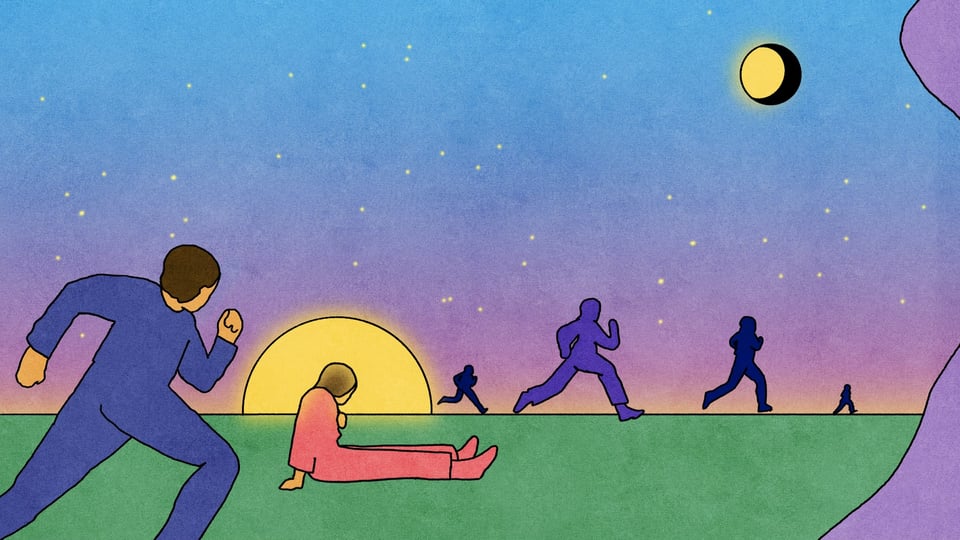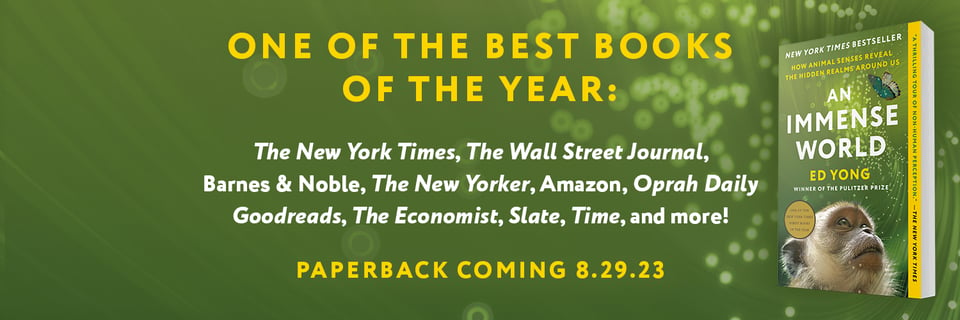The Ed's Up - A Slightly Lighter Immense World
Hi all,
A Slightly Lighter Immense World
I'm delighted to say that the paperback of AN IMMENSE WORLD will be out in three weeks, on August 29. This is an excellent time to pre-order (Barnes & Noble; indie bookstores) if you've been waiting for the softer-edged edition; if you want to stock up early on some holiday season gifts; or if you've only ever listened to the audiobook--the print version has color images of many of the book's protagonists, and some great footnotes. Pre-ordering is a great way of supporting books and authors.
Book recommendations
Speaking of supporting authors, I'll be using this newsletter to talk about books that I've recently read and loved.
Trust, by Hernan Diaz
Four stories, all distinct in style, run alongside, enhance, and contradict each other. They're about money as a society-upending force and an almost ludicrously abstract concept. They're about power, and the ways in which history is shaped. A phenomenal book that fully deserves its Pulitzer and every other accolade that has been heaped upon it.
The Furrows, by Namwali Serpell
A singular book about grief that is entirely like its subject. It morphs constantly, shifting genre whenever it seems to settle on one. It offers plenty of profundity but little closure. It defies easy description but its core is captured by its first two lines: “I don’t want to tell you what happened. I want to tell you how it felt.”
Life on Delay, by John Hendrickson
An impossibly moving reported memoir by my former colleague, who works his way through his entire history in an effort to better understand the stutter that has shaped and defined his life.
The Swimmers, by Julie Otsuka
It's a pitch-perfect satire of niche communities. It's a heartbreaking portrait of dementia. It's a unique hyperspatial object. Impossible to really describe, except to say that this is a book by an author who absolutely knows what she's doing.
And here are a few upcoming books that I've blurbed, and that I encourage you to pre-order:
California Against the Sea, by Rosanna Xia
"Just as the coast defines the liminal world between land and sea, so too does Rosanna Xia's remarkable book exist in the overlap between development and erosion, between geological forces and human desire, between our ambitious past and our tenuous future. It's viscerally urgent, thoroughly reported, and compellingly written--a must-read for our uncertain times."
Against Technoableism, by Ashley Shew
"Authoritative, witty, thoughtful, and unafraid to throw a punch, Ashley Shew pushes us headlong toward a much-needed world in which disabled people are seen as experts in their lives, curators of their stories, and vibrant, essential, generative parts of our collective future."
How Infrastructure Works, by Deb Chachra
“The urgent problems of the modern era have instilled in so many of us a deep craving to more clearly see the systems that define our lives, to better understand when and why they fail, and to regain agency over a world that can seem too complex to understand much less affect. Fortunately, Deb Chachra has written exactly the book we needed. Revelatory, superbly written, and pulsing with wisdom and humanity, How Infrastructure Works is a masterpiece.”
A Brief Note About Subscriptions
As I noted last week, this newsletter is free to read, but you can pay an optional subscription (at whatever level you set) if you'd like to support my work. We had a few teething glitches but I think those should now be resolved. I've also tried to make this clear on the subscription page, but the number you input is a monthly payment.
If you meant to make a one-off donation instead, you can either cancel the recurring charge, or email me and I'll do it.
Speaking events
In this newsletter, I'll keep a running list of public speaking events where you can come and hear me talk, or get your books signed. (If you're interested in booking me for an event, please contact my wonderful speaking agent, Stasia Whalen swhalen@penguinrandomhouse.com.)
Sep 12 – National Writers Series in Traverse City, Michigan. I’ll be talking about An Immense World
Sep 15 – University of Notre Dame in Notre Dame, Indiana. I’ll be talking about empathy and equality in science writing.
Oct 14 – Wheeler Centre in Melbourne, Australia. I’ll be talking about An Immense World
Oct 23 – Animal Law Conference in Los Angeles, California. I’ll be talking about An Immense World, and the philosophical implications of animal senses.
Nov 8 – USC Delta Murphy Lecture at Los Angeles, California. I’ll be talking about An Immense World, and the importance of storytelling.
Nov 30 – Friends of the Hennepin County Library at Hopkins, Minnesota. I’ll be talking about An Immense World
And finally, a note about fatigue
 Two newsletters ago, I mentioned my last piece for the Atlantic--I resigned last week for those who missed that news--which is about what "fatigue" really means for people with long COVID, ME/CFS, and related illnesses.
Two newsletters ago, I mentioned my last piece for the Atlantic--I resigned last week for those who missed that news--which is about what "fatigue" really means for people with long COVID, ME/CFS, and related illnesses.
Whenever I write about these conditions, I get waves of emails from people who say that they finally feel seen, heard, and validated--sometimes after years or even decades of disbelief. Such messages are gratifying, but they also feel like a horrible indictment of our societal capacity for empathy.
But with the new piece, something slightly different happened. Alongside the usual messages, I also got a wave of notes from people who are themselves healthy and able-bodied, but who finally understand what their chronically-ill loved ones are going through, and who, armed with that new knowledge, will show up for said people in a better way.
It is hard to express how much that means. I always intended these pieces to act as empathy bridges--tools that long-haulers could take to medical appointments, send to family group-chats, and use to open up conversations with people in their lives. I become more hopeful when that model actually works, and even more so when long-haulers--who, I'll remind you, have energy-limiting illnesses--don't have to do the hard work of initiating those conversations themselves.
Of course, this model only works if people can actually access the work, and diseases like long COVID often leave people in financially difficult positions where magazine subscriptions can be unfeasibly costly. So if long-haulers, anyone with related chronic illnesses, or any of their family, carers, or doctors, need to read my long COVID or MECFS pieces and cannot afford to, email edyong210@gmail.com and I'll send you a copy. I did this work to help people.
That's it for this week. I'm still working out how best to use this newsletter, but this'll be the basic form for now.
In strength and solidarity,
-Ed
